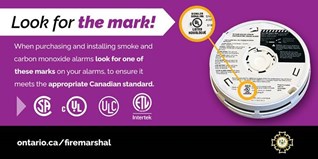North Bay, ON – May 19, 2021 – Residential fires burn hotter, faster, and more toxic than ever before, which is why North Bay Fire and Emergency Services places so much emphasis on public fire safety education and fire safety standards and enforcement.
Fire services in Ontario's best fire prevention and public education success story has been the increased widespread trust and adoption that working smoke and carbon monoxide (CO) alarms will help save lives.
An issue has been brought to the attention of Ontario’s Fire Chief’s whereby online retailers were selling smoke and CO alarms in Ontario without meeting the proper Canadian or Ontarian standards; any smoke or CO alarm sold in Canada must comply with the appropriate Canadian standards.
For example, UL Canada's safety certification services include testing, evaluation and factory surveillance of products to Canadian and international standards for safety. These certifications enhance the safety of products as well as the public’s confidence in their compliance. Uncertified smoke or carbon monoxide alarms may not meet Canadian performance standards and may fail to operate properly, posing a health or safety risk to Canadians.
Research conducted by the Ontario Fire Marshal’s Office showed that multiple online retailors (Amazon, WalMart, eBay, and others) are listing and selling smoke and CO alarms through third party vendors in Ontario without meeting the appropriate standards - missing the ULC certification marks. These third-party sellers are selling products outside of the host websites control, thus making enforcement of Canadian standards problematic.
When purchasing a smoke or CO alarm, look for a recognized Canadian certification mark such as CSA, cUL, ULC or cETL, which should appear directly on the product -- not just the packaging. If the certification information is not available on the product website, ask the seller to confirm that the product is certified to Canadian standards and that it bears a Canadian certification mark before you buy the product. If you feel unsure, do not take the risk of purchasing these products.
What should you do:
- Immediately replace any smoke and CO alarms in your home that do not bear a Canadian certification mark, and replace them with ones that do, such as CSA, cUL, ULC or cETL.
- When purchasing a smoke or CO alarm, make sure the device bears a recognized Canadian certification mark directly on the product, not just the packaging.
- Follow the manufacturer's directions for installation, maintenance, testing and replacement of the alarm.
- Clean and test your smoke and CO alarms every month.
- Replace your smoke and CO alarm batteries every six months, replace expired alarms (any alarm older than 10 years of age) and consider installing 10-year sealed battery alarms.
